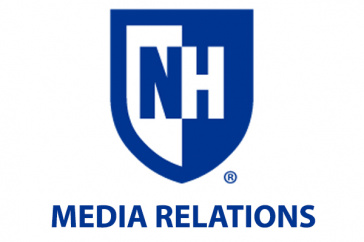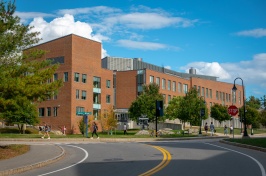The University of New Hampshire inspires innovation and transforms lives in our state, nation and world. More than 16,000 students from all 50 states and 71 countries engage with an award-winning faculty in top-ranked programs in business, engineering, law, health and human services, liberal arts and the sciences across more than 200 programs of study. A Carnegie Classification R1 institution, UNH partners with NASA, NOAA, NSF and NIH, and received $260 million in competitive external funding in FY21 to further explore and define the frontiers of land, sea and space.
UNH Launches New Center on Environmental Acoustics

DURHAM, N.H.—The University of New Hampshire has launched a new center focused on the science of sound. The Center for Acoustics Research and Education (CARE) will bring together expertise across wide-ranging disciplines and provide acoustics research, education and outreach opportunities for government and industry partners across the U.S.
Acoustics is a branch of physics that involves the properties of sound waves; more specifically, CARE will initially focus on environmental acoustics, which takes into account sound movement through the air, on land, and under water.
“Acoustics is being used in ways it’s never been used before, like in the biomedical fields and for agricultural pest control,” said Jennifer Miksis-Olds, research professor in UNH’s School of Marine Science & Ocean Engineering and director of CARE. “The fact that acoustics is becoming more widely applied to address everyday challenges highlights its importance. A lot of people don’t think about acoustics unless it’s a problem — like highway noise or bad acoustics in a restaurant or concert hall, but I would like us to celebrate acoustics for its positive values and for its contributions in helping us address societal challenges.”
Anthony Lyons, research professor in the Center for Coastal and Ocean Mapping and CARE’s associate director for research noted that while the university currently focuses on underwater acoustics, the creation of the center will support expansion into other fields, like music, speech and medicine. “There’s no center exactly like this in the nation, and there’s clearly a need for one.” Lyons said that he’s already heard from industry and government partners interested in opportunities for professional development and collaboration in the acoustics field.
Dan Howard, assistant professor of biological sciences, will serve as CARE’s associate director for education, tasked with providing professional development courses for those outside the university and developing a graduate certificate program for university students.
Latest News
-
September 15, 2025
-
August 21, 2025
-
August 12, 2025
-
August 5, 2025
-
June 25, 2025














































